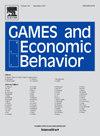合理化分享规则
IF 1
3区 经济学
Q3 ECONOMICS
引用次数: 0
摘要
合伙企业可以产生回报——相对于合伙人的投资是亏损还是盈利。合伙人应该如何分享回报?我们确定了满足经典性质(对称性、一致性和连续性)的共享规则,并避免了伙伴份额的任意边界。我们表明,任何这样的规则都可以在其建议与最大化可分离福利函数的建议一致的意义上合理化。在这些规则中,我们描述了那些形式化不同比例概念的规则,特别是由单个不等式厌恶参数指定的方便子类。我们还探讨了规则何时可以通过更普遍的福利函数来合理化。我们的中心结果扩展到更广泛的资源分配问题。本文章由计算机程序翻译,如有差异,请以英文原文为准。
Rationalizing sharing rules
A partnership can yield a return—a loss or a profit relative to the partners' investments. How should the partners share the return? We identify the sharing rules satisfying classical properties (symmetry, consistency, and continuity) and avoiding arbitrary bounds on a partner's share. We show that any such rule can be rationalized in the sense that its recommendations are aligned with those maximizing a separable welfare function. Among these rules, we characterize those formalizing different notions of proportionality and, in particular, a convenient subclass specified by a single inequality aversion parameter. We also explore when a rule can be rationalized by a more general welfare function. Our central results extend to a wider class of resource allocation problems.
求助全文
通过发布文献求助,成功后即可免费获取论文全文。
去求助
来源期刊

Games and Economic Behavior
ECONOMICS-
CiteScore
1.90
自引率
9.10%
发文量
148
期刊介绍:
Games and Economic Behavior facilitates cross-fertilization between theories and applications of game theoretic reasoning. It consistently attracts the best quality and most creative papers in interdisciplinary studies within the social, biological, and mathematical sciences. Most readers recognize it as the leading journal in game theory. Research Areas Include: • Game theory • Economics • Political science • Biology • Computer science • Mathematics • Psychology
 求助内容:
求助内容: 应助结果提醒方式:
应助结果提醒方式:


